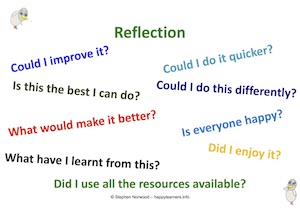Helping all children become happy learners
Metacognition
Introduction
Metacognition is understanding how we learn.
A teacher is someone who helps children to learn and an inclusive teacher is someone who helps all children to learn. As not all children learn the same way, the inclusive teacher needs to be able to recognise and respect individual learning differences. Support and interventions are, therefore, only truly inclusive when they are matched to each child's learning strengths and weaknesses. The inclusive teacher must strive for a personalised learning experience for each child. I say strive because ultimately it is an almost impossible task, given the scope and complexity of delivering a trully personalised learning curriculum for everyone. However, one approach that is wholly personalised is to teach children and students metacognition. This is the self-awareness of their own preferred approach to learning and being able to develop strategies to work round learning weaknesses. Too often is it assumed that older children and students know how they learn best. This is rarely the case unless specifically and explicitly taught. Every lesson is an opportunity for every teacher to help children develop metacognition. For children with developmental and learning disorders additional interventions are required to develop their awareness of their learning abilities and memory skills.
Key Questions For The Teacher
Do students know how they learn?
What makes learning easier or harder?
What strategies do they know to use when trying to learn?
What explicit teaching of study skills do they receive and how often?
Key Questions FOr The Learner
How do I learn best?
What helps me overcome problems?
What help is available to me?
How can I improve the way I learn?
Strategies
Discuss and draw attention to the process of the task rather than the subject matter or outcome. For example:
'Well done, you got it right. Now tell me how you did it?'
Discuss the skills used to accomplish a task. For example:
'Well done, that's a difficult spelling. What helped you get it right?'
Discuss the attributes that will be needed to complete a challenge. For example:
'What qualities and skills will you need to research this project?'
Build in time for peer-talk discussing what they have learnt about learning either generally or specific to a task. For example:
'Discuss with a partner what skills you needed to write this report.'

Advertisement





